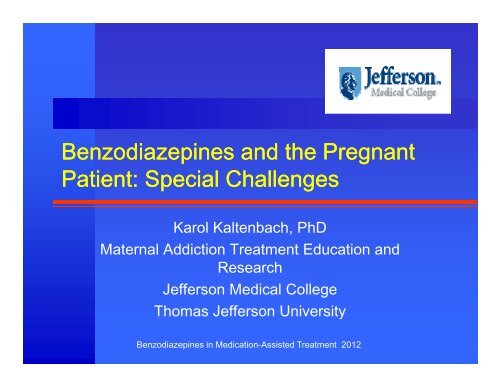Benzodiazepines and the Pregnant Patient: Special ... - IRETA
Benzodiazepines and the Pregnant Patient: Special ... - IRETA
Benzodiazepines and the Pregnant Patient: Special ... - IRETA
Create successful ePaper yourself
Turn your PDF publications into a flip-book with our unique Google optimized e-Paper software.
<strong>Benzodiazepines</strong> <strong>and</strong> <strong>the</strong> <strong>Pregnant</strong><br />
<strong>Patient</strong>: <strong>Special</strong> Challenges<br />
Karol Kaltenbach, PhD<br />
Maternal Addiction Treatment Education <strong>and</strong><br />
Research<br />
Jefferson Medical College<br />
Thomas Jefferson University<br />
<strong>Benzodiazepines</strong> in Medication-Assisted Treatment 2012
Outline<br />
• Introduction<br />
ti<br />
• <strong>Special</strong> Challenges<br />
• Suggested Strategies<br />
• Summary<br />
<strong>Benzodiazepines</strong> in Medication-Assisted Treatment 2012
Introduction<br />
• <strong>Benzodiazepines</strong> are one of <strong>the</strong> most widely<br />
prescribed medications to women<br />
• Generally used to treat insomnia <strong>and</strong> anxiety<br />
• Women are more likely than men to be<br />
prescribed benzodiazepines when presenting<br />
to <strong>the</strong> physician for non-medical symptoms<br />
such as stress or life changes<br />
• Women are more likely to be prescribed<br />
benzodiazepines for a longer period of time<br />
<strong>Benzodiazepines</strong> in Medication-Assisted Treatment 2012
Introduction<br />
Opioid dependent women have<br />
• High rates of depression (69.4%)<br />
• High rates of anxiety (78%)<br />
Green et al., Drug <strong>and</strong> Alcohol Dependence, 2009<br />
Opioid dependent pregnant women<br />
• 37% had primary mood disorder<br />
Of those, 44% also had anxiety disorder<br />
• 36% had a primary anxiety disorder<br />
Of those, 37% also had a mood disorder<br />
Fitzsimons et al., Journal of Substance Abuse Treatment<br />
<strong>Benzodiazepines</strong> in Medication-Assisted Treatment 2012
Introduction<br />
• Literature search does not identify any studies that<br />
provide data regarding <strong>the</strong> use of benzodiazepines<br />
by pregnant opioid dependent women<br />
• National Survey on Drug Use <strong>and</strong> Health (NSDUH)<br />
reports on prescription misuse but does not provide<br />
data by drug category for pregnant women.<br />
• However, for <strong>the</strong> MOTHER study recently published<br />
in <strong>the</strong> NEJM, 44% of <strong>the</strong> 199 pregnant opioid<br />
dependent women screened for <strong>the</strong> study at our site<br />
did not meet <strong>the</strong> inclusion criteria due to a<br />
benzodiazepine substance use disorder<br />
<strong>Benzodiazepines</strong> in Medication-Assisted Treatment 2012
<strong>Special</strong> Challenges<br />
• High risk population with complex issues<br />
• <strong>Pregnant</strong> patient – outcome of fetus must<br />
always be considered<br />
• Risk of use of medication during pregnancy<br />
must be weighed against <strong>the</strong> risk associated<br />
with untreated disease <strong>and</strong> relapse<br />
• Must be concerned of withdrawal because of<br />
potential adverse effects on <strong>the</strong> fetus<br />
<strong>Benzodiazepines</strong> in Medication-Assisted Treatment 2012
<strong>Special</strong> Challenges<br />
• All classes of benzodiazepines i cross <strong>the</strong> placenta<br />
<strong>and</strong> are secreted in breast milk<br />
• Most have a category D rating: There e is some<br />
evidence of human fetal risk but potential benefits<br />
may warrant use of <strong>the</strong> drug in pregnant women<br />
• Four have a category X rating: Risk involved in use in<br />
pregnancy clearly outweigh <strong>the</strong> potential benefits<br />
• Flurazepam (Dalmane)<br />
• Estazolam (ProSom)<br />
• Temazepam (Restoril)<br />
• Quazepam (Doral)<br />
<strong>Benzodiazepines</strong> in Medication-Assisted Treatment 2012
<strong>Special</strong> Challenges<br />
• Medical detoxification not often available for<br />
pregnant patients<br />
• Slow taper is recommended to avoid preterm<br />
labor or exacerbation of psychiatric<br />
symptoms<br />
• Prenatal exposure to benzodiazepines<br />
exacerbate <strong>the</strong> neonatal abstinence<br />
syndrome (NAS) associated with medicated<br />
assisted treatment<br />
<strong>Benzodiazepines</strong> in Medication-Assisted Treatment 2012
<strong>Special</strong> Challenges<br />
• Not all use/abuse is <strong>the</strong> same <strong>and</strong> different<br />
management strategies are required.<br />
• Benzodiazepine use may be<br />
Prescribed <strong>and</strong> used appropriately<br />
Prescribed <strong>and</strong> misused<br />
<strong>Patient</strong> does not have a prescription but is<br />
dependent on illicit benzodiazepines<br />
• These three categories are not always mutually<br />
exclusive<br />
<strong>Benzodiazepines</strong> in Medication-Assisted Treatment 2012
Strategies<br />
• Prescribed benzodiazepine<br />
i<br />
• Must sign a consent allowing <strong>the</strong> physician <strong>and</strong> Family Center<br />
Medical Director to communicate.<br />
cate<br />
• Use is monitored by weekly GCMS UDS; taper may be initiated<br />
to reduce use; medical assessment is made to determine<br />
appropriate p medication, e.g. transfer to Klonopin/SSRI, <strong>and</strong>/or<br />
non-medication options<br />
• In order to address safety issues, if patient choses not to<br />
consent or is misusing gprescribed medication she will be<br />
managed as if <strong>the</strong> benzodiazepine is not prescribed<br />
<strong>Benzodiazepines</strong> in Medication-Assisted Treatment 2012
Strategies<br />
• Use/abuse of non-prescribed benzodiazepines<br />
• Limit methadone dose increases from initial<br />
stabilization<br />
• Initiate slow taper<br />
• Assign medicating time<br />
• Utilize 7 day medicating schedule (no take<br />
homes)<br />
• Conduct weekly GCMS urine drug screens<br />
• Modifications made in accordance with UDS<br />
levels <strong>and</strong> clinical observations<br />
<strong>Benzodiazepines</strong> in Medication-Assisted Treatment 2012
Strategies<br />
• Additional clinical interventions<br />
• Primary counselor/<strong>the</strong>rapist discusses safety<br />
issues with patient; weekly monitoring of<br />
benzodiazepine levels; barriers to engagement or<br />
re-engagement in recovery; purpose of behavioral<br />
contracts including timeframes for change<br />
• Weekly multidisciplinary staff meeting to discuss<br />
UDS results <strong>and</strong> dose change requests<br />
• Weekly Prenatal class<br />
• Obstetricians address UDS results at prenatal<br />
visits<br />
<strong>Benzodiazepines</strong> in Medication-Assisted Treatment 2012
Strategies<br />
• Therapist addresses concomitant anxiety in<br />
individual sessions, e.g. CBT<br />
• Behavioral Health Peer <strong>Special</strong>ist<br />
provides outreach <strong>and</strong> support to promote<br />
engagement in recovery<br />
• Mindfulness Based Stress Reduction<br />
Intervention<br />
<strong>Benzodiazepines</strong> in Medication-Assisted Treatment 2012
Summary<br />
• Pregnancy presents a special challenge<br />
• Strategies must be focused on safety of<br />
both mo<strong>the</strong>r <strong>and</strong> fetus<br />
• Multiple types of clinical interventions<br />
are necessary<br />
• The guiding principal is safe prescribing<br />
<strong>and</strong> effective treatment interventions<br />
<strong>Benzodiazepines</strong> in Medication-Assisted Treatment 2012








